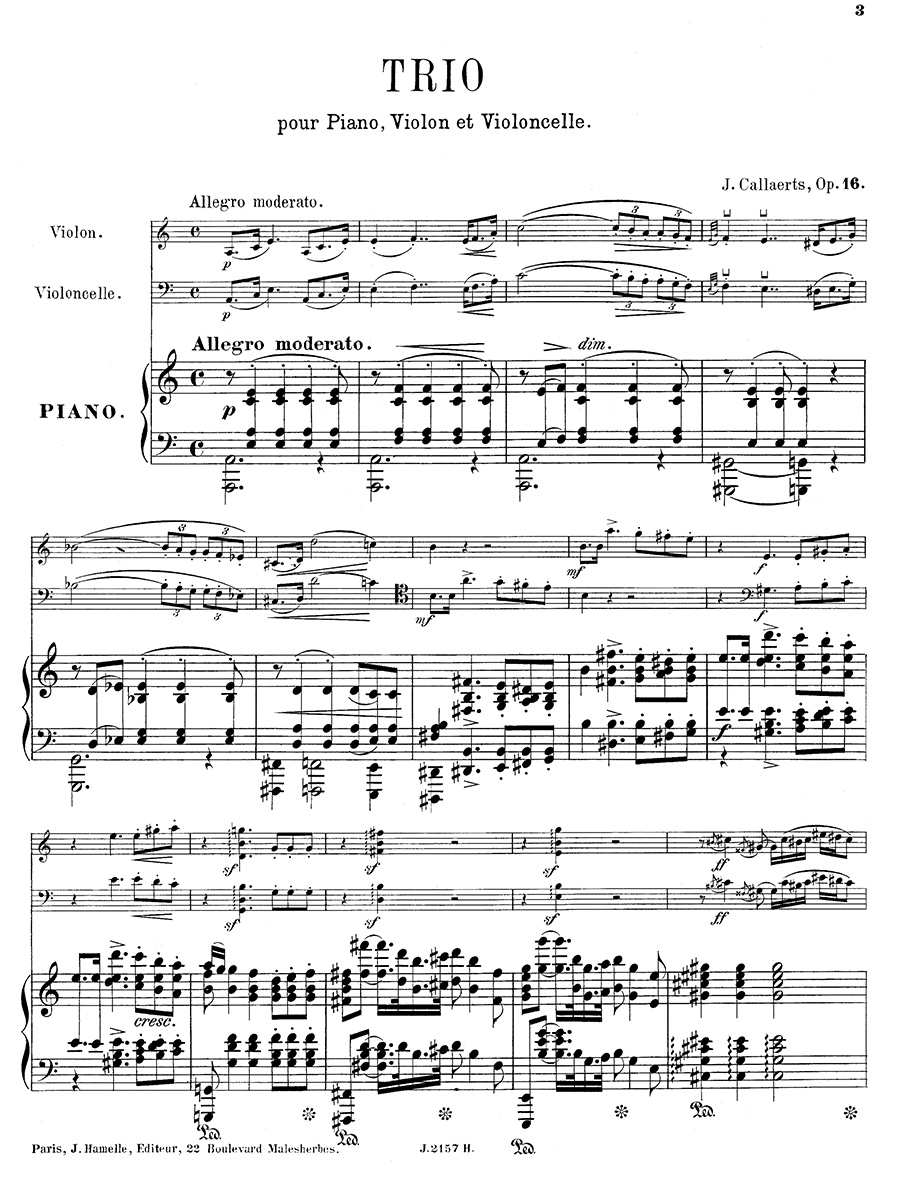Trio (la mineur) pour piano, violon et violoncelle, Op. 16 (score and parts)
Callaerts, Joseph
26,00 €
Preface
Joseph Callaerts
(Antwerp, 11 August 1830 – 3 March 1901)
Trio (A minor) for Piano, Violin and Cello, opus 16 (1882)
The musical life of Joseph Callaerts revolved around the organ. He was a respected composer, performer and improviser, and enjoyed a great reputation as a teacher. He maintained an active local and international concert life, received several awards, was given important composition assignments, was a jury member in many competitions, and was often invited to inaugurate new organs. In 1892, he was granted the medal of “Knight in the Order of Leopold”. His compositions were widely appreciated during his lifetime, but their popularity has been decreasing from the first decades of the twentieth century onwards.
Callaerts was trained as a choirboy in the Antwerp Cathedral of our Lady, under Kapellmeister Guillaume J. J. Kennis and choirmaster Corneel Schermers. Later, he was apprenticed to composer and violinist Henri Simon, and composer, pianist, pedagogue and author Edouard Grégoir. From 1850, he served as organist for the Jesuits. While he was studying at the Brussels Conservatory with Jacques-Nicolas Lemmens, he was already granted the position of organist of the Antwerp Cathedral. In 1963, the post of city carilloneur was added, and in 1867 he was appointed as organ teacher (and later practical harmony teacher) in Peter Benoit’s Antwerp Flemish Music School, which was to become the Royal Conservatory of Antwerp in 1898. Jan Blockx, Emile Wambach, Willem De Latin and Lodewijk Mortelmans were some of his notable students.
Besides a large number of organ works, including an organ concerto, Callaerts composed piano and chamber music, choral works and cantatas, songs, orchestral works, music for harmony and fanfare, an opera-comique, and a lot of liturgical music, such as motets, litanies, and masses. Callaerts has a traditionalist composer profile. Unlike his contemporary Peter Benoit, he did not experiment with innovative forms and he had no ambition to convey a political or social message with his music.
Callaerts’s Trio opus 16 – his only chamber piece for three instruments – was awarded a first prize (gold medal) by the Royal Academy of Belgium in 1882. It was published in Paris with Julien Hamelle, who also accommodated Fauré, Franck and Saint-Saëns. The piece is dedicated to “Monsieur le Chevalier” Léon de Burbure de Wesembeek (1812-1889), a composer and musicologist who was passionate about archaeology and active as a collector and archivist.
Callaerts’s substantial and characterful trio consists of five movements:
Allegro Moderato (A minor)
Andante (Cantabile) (E major)
Scherzo (Allegro non troppo) (A minor) – Trio (F major) – Scherzo da capo
Fantasia (Adagio) (A major)
(attaca) Final (Allegro vivo) (A major)
… (Liselotte Sels)
Read full preface (English, German, Flemish) > HERE
Score Data
| Special Edition | The Flemish Music Collection |
|---|---|
| Genre | Chamber Music |
| Size | 225 x 320 mm |
| Printing | Reprint |
| Specifics | Set Score & Parts |
| Pages | 82 |
